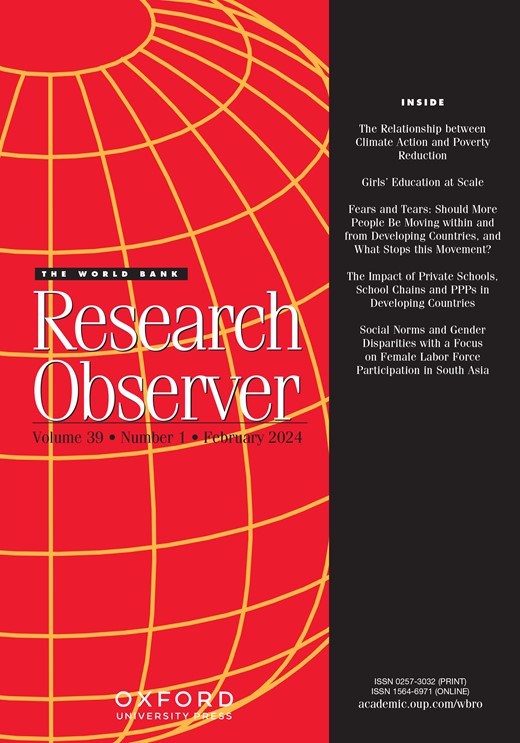低收入和中等收入国家现金转移和亲密伴侣暴力的混合方法研究
IF 3.3
1区 经济学
Q1 DEVELOPMENT STUDIES
引用次数: 186
摘要
越来越多的证据表明,现金转移(CT)计划减少亲密伴侣暴力(IPV);然而,人们对ct如何达到这种效果知之甚少。我们对低收入和中等收入国家的研究进行了混合方法综述。14项定量研究和9项定性研究符合我们的纳入标准,其中11项和6项分别证明了ct降低IPV的证据。我们几乎没有发现支持IPV增加的证据,只有两项研究显示了总体混合或不利的影响。根据这些研究以及相关的证据,我们发展了一个程序理论,提出了CT影响IPV的三种途径:1)经济安全和情感健康,2)家庭内部冲突,3)妇女赋权。经济安全和福利途径假设IPV减少,而其他两个途径的影响模糊,这取决于项目设计特征和对项目组成部分的行为反应。未来的研究应完善IPV测量、实证分析规划机制、填补区域空白。规划框架和补充活动,包括那些能够改变家庭内部权力关系的活动,可能是理解如何最大化和利用ct的影响以减少IPV和减轻潜在不利影响的重要设计特征。本文章由计算机程序翻译,如有差异,请以英文原文为准。
A Mixed-Method Review of Cash Transfers and Intimate Partner Violence in Low- and Middle-Income Countries
There is increasing evidence that cash transfer (CT) programs decrease intimate partner violence (IPV); however, little is known about how CTs achieve this impact. We conducted a mixed method review of studies in low- and middle-income countries. Fourteen quantitative and nine qualitative studies met our inclusion criteria, of which eleven and six respectively demonstrated evidence that CTs decrease IPV. We found little support for increases in IPV, with only two studies showing overall mixed or adverse impacts. Drawing on these studies, as well as related bodies of evidence, we developed a program theory proposing three pathways through which CT could impact IPV: 1) Economic security and emotional wellbeing, 2) intra-household conflict, and 3) women’s empowerment. The economic security and wellbeing pathway hypothesizes decreases in IPV, while the other two pathways have ambiguous effects depending on program design features and behavioural responses to program components. Future studies should improve IPV measurement, empirical analysis of program mechanisms, and fill regional gaps. Program framing and complementary activities, including those with the ability to shift intra-household power relations are likely to be important design features for understanding how to maximize and leverage the impact of CTs for reducing IPV, and mitigating potential adverse impacts.
求助全文
通过发布文献求助,成功后即可免费获取论文全文。
去求助
来源期刊

World Bank Research Observer
Multiple-
CiteScore
12.60
自引率
1.20%
发文量
8
期刊介绍:
The World Bank Journals, including the Research Observer, boast the largest circulation among economics titles. The Research Observer is distributed freely to over 9,100 subscribers in non-OECD countries. Geared towards informing nonspecialist readers about research within and outside the Bank, it covers areas of economics relevant for development policy. Intended for policymakers, project officers, journalists, and educators, its surveys and overviews require only minimal background in economic analysis. Articles are not sent to referees but are assessed and approved by the Editorial Board, including distinguished economists from outside the Bank. The Observer has around 1,500 subscribers in OECD countries and nearly 10,000 subscribers in developing countries.
 求助内容:
求助内容: 应助结果提醒方式:
应助结果提醒方式:


